On September 14th, Jean Claude Juncker, on behalf of the European Commission, reviewed a year of EU achievements and outlined his action plan for the next twelve months in the much anticipated “State of the Union” speech. We, 52 young feminists, representing 22 diverse European countries, have written our response – a feminist State of the Union.
The European Union (EU) has brought peace and economic prosperity to the continent for the last six decades. We, young and diverse feminists across Europe, are not denying the progress set in motion by the EU. Nonetheless, we will not remain silent about the harsh reality in which we live. Equality policies are still far from sufficient and gender equality is still considered as a secondary goal, even though it is a core value of the EU and one of the Sustainable Development Goals set by the UN.
As is explicitly stated in the treaties, the Union stands for combating of social exclusion and discrimination, and the promotion of social justice and protection, equality between women and men, solidarity between generations and protection of the rights of the child. It is time that the EU applies what it has committed to.
A society where gender equality is achieved is a society which offers a better quality of life for all of its citizens. The austerity policies that have swept across Europe in the past few years have undermined gender equality and disproportionately negatively impacted women. As young feminists, we want to believe in a future where a gender lens will be applied to ‘neutral’ decision making, and not simply as as ‘add on’ to policies. We are convinced that the promotion of gender equality in a universalist, holistic and intersectional approach will achieve an open, tolerant and diverse society where people, regardless of background, can build a full and prosperous life.
This Feminist State of Union has the purpose to give a clear overview of core feminist actions and problems in the European countries in 2016. In the EU, women and non-binary people are still disproportionately victimised as a consequence of their gender identity. The EU has a record of good work on women’s rights but much more still needs to be done. Feminists from around Europe were compelled to write a feminist State of Union as a response to the fact that our rights are at best questioned, and at worst disregarded when crises hit. This statement should serve as a tool to start the conversation on how we can work to create a better society for all, throughout the EU.
Moreover, this report seeks to draw attention to the fact that there is a lack of intersectional statistics available on the Eurostat websites. It is generally known that discrimination can take multiple forms, and as a result it is fundamental that we start to analyse gender alongside factors such as race, disability, age and class. We must recognise that intersectional discrimination is a systemic barrier to the achievement of equality for many marginalised women, and as a result we urge the EU to address and ensure full recognition of intersectionality in all policies, legislation and initiatives related to all forms of discrimination.
- Fight Violence Against Women and Girls
Violence against women and girls is deeply rooted in gender-based discrimination, stereotypes and social norms. As a result, we strongly believe that we must challenge the status quo and fully invest in proper education policies to teach gender equality from a young age all around Europe. Policies should aim to break the cycle of impunity, revise marriage laws, scrap the idea that a one-size-fits all programmatic approach is sufficient to putting an end to gender-based violence. Moreover, we must listen to women as knowledge bearers and start to focus on the local level, as well as support local expert services so that they can create the necessary support when developing responses to violence against all women. Such responses should also take into account the acute vulnerability of those from minority groups: be they Black and Minority Ethnic (BME), LGBT+ or disabled women.
- Protect the Sexual Health and Reproductive Rights of Women
According to the World Health Organization (WHO), every year, there are an estimated 40-50 million abortions. 21.6 million women experience an unsafe abortion worldwide and 47,000 women die from complications of unsafe abortion each year. Issued in 2016, General comment No. 22 on the right to sexual and reproductive health (article 12 of the International Covenant on Economic, Social and Cultural Rights) states that a wide range of contraceptive methods and abortion should be available for women. Despite this international recognition of women’s reproductive rights, women in Europe are still deprived from their basic right to their bodily autonomy.
In Ireland, Poland, Northern Ireland, Isle of Man and Malta abortion is restricted. Furthermore, in Italy and Turkey, women’s access to abortion services are becoming more and more restricted, whilst in Hungary and Croatia, abortion services are under threat and attack. Moreover, in Malta, women’s access to contraceptives is also limited. Women in these countries have to travel to other European countries to access safe abortion services or risk their health and life by using unsafe abortion methods or face being forced into unwanted pregnancies.Women are not reproductive vessels, and abortion restrictions are incompatible with the Union’s commitments to international law. As young feminists we want safe, legal and accessible abortion services across Europe, as well as access to contraception, in order to have full bodily autonomy. We also feel that in the same spirit of freedom, every woman, no matter her marital status or sexual orientation, should have access to medically-assisted procreation.
- Improve Women’s Representation in Decision-Making Processes
In the latest legislature, only 37% of members of the European Parliament and 27% of national parliamentarians are women. BME women, women with disabilities, or women from the LGBT+ community are barely represented at all. Only 28% of high-level administrators in the European Commission are women, while women account for approximately 23% of board members of the largest companies registered in the EU member states. Women make up a mere 19% of the judiciary in the European courts. This situation is unacceptable, but sadly reflects the often sexist nature of European and national politics, administrations and judiciaries. Lack of representation results in women often feeling alienated from decision-making structures and without a voice in the decision-making process. As their voice is unheard, their rights are threatened.
In order to tackle this lack of representation, the EU should develop and support programmes with the aim of empowering and providing women with confidence and experience in leadership roles. All political parties and groups at EU and national level should be required to make a concerted effort to nominate and promote female candidates in order to achieve gender parity in political representation. The EU institutions need to adopt binding legislation to ensure gender parity in recruitment and promotions in public services. Lasting equality cannot be achieved without an “empowerment policy” toward women all around Europe. Women of all backgrounds need to be considered and represented in decision-making structures in order to achieve a truly equal society for all.
- End the Pay and Pension Gap
While the principle of equal pay was introduced at the European level as early as in the Treaty of Rome in 1957, still today women earn on the average 16.1% per hour less than men in EU member states. This difference in salary is predominantly caused by the persistence of entrenched gendered roles and expectations. For example, women are more likely to work in part-time jobs to allow for the care of children or the elderly. This can lead to lower earnings per year, a process which culminates in a lifelong earnings gap of 41%. Due to maternity leave or breaks in their career due to care work, women are less likely to be offered promotions and experience more difficulty in integrating in the labour market. Countries’ policies on work-life balance play an essential role for the position of women on the pay-scale. Indeed, the ability of women to easily return to work has a great impact on women’s work opportunities and therefore on their salary. In a nutshell, women earn less than men across EU member states.
It is also vital to note that women are not a homogenous group. Disabled women often face additional barriers to accessing the labour market. Also, while women in public sector tend to have a lower pay gap than women working in the private sector, they are less likely to be in decision-making positions. Older women experience a larger pay gap than their younger counterparts. It is important to stress that differences in salaries also impact on pensions. The less women earn, the less likely they are able to sustain themselves at the age of retirement. The gender pension gap in the EU is over 40%, which means poverty for many women as they age. We need to actively tackle pay and pension inequality immediately at EU and national levels to provide women the means to be financially independent.
- Fight against the Rise of Conservative/Far-Right Political Forces
Our common history has shown to what extent economic crises impact the values of a society. The threat of austerity, the gloomy economic climate and a chaotic international context that has lead to the so-called “migrant crisis” have been accelerants for the recent rise of conservative forces all around Europe. The results of the latest European election are alarming with a significant increase in far right parties being represented in the European Parliament. It is even more alarming to see that this phenomenon is being replicated on a national level. The economic crisis and long-term unemployment are feeding the bitterness of the European population, resulting in an “anti-establishment” vote. Unfortunately, it is not a vote towards progress but a vote of fear, as the population is reacting to the crisis by turning to traditional and well-established societal and patriarchal values that are deemed “reassuring.” This is putting women back in their traditional roles of wives and mothers, in an heteronormative and patriarchal society.
The rise of conservative and far right forces is a major threat to all the battles won by the feminist movement over the last 60 years. Today, it is also a threat to Europe and the EU’s ideas and values. In a time of crisis, where the paradigm of everlasting economic growth is questioned, we need more than ever an open society, and a turn towards acceptance and not the fear of the others.
We, Young Feminists, are determined to stand strong to achieve an effective gender equality.
Because we are the children of an open-minded and generous European Union,
Because we need progress and hope more than ever,
Because we are deeply convinced that a society where women are living as free, fulfilled and considered human beings, is a society that is working its way toward happiness,
Because we believe in values of equality, liberty, and tolerance – no matter our class, sex, sexual orientation, race, religion.
We want a feminist European Union for a better future. Now.
Bibliography
UN Sustainable Development Goals, Gender Equality
Values and Objectives of the Union
Violence Against Women and Girls
European Union Agency for Fundamental Rights (FRA) Violence against women: an EU-wide survey – Main results, 2014.
End FGM – European Network
End the Fear, Disabled women 2 to 5 times more likely to experience sexual violence than non-disabled women, 2015.
European Women’s Lobby, The Price of Austerity – The Impact on Women’s Rights and Gender Equality in Europe, 2012.
Sexual Health and Reproductive Rights of Women
World Health Organization, Sexual and reproductive health – preventing unsafe abortion, 2008.
Abortion Clinics – European Network
United Nations Human Rights Office of the High Commissioner – Right to sexual and reproductive health indivisible from other human rights
Women in Decision-Making
European Commission, Database on Women and Men in Decision-Making, 2016.
EIGE, Review of the Implementation of the Beijing Platform for Action in the EU Member States, 2015.
Gender Pay Gap
EIGE, Gender gap in pensions in the EU. Research note to the Latvian Presidency, 2015.
European Commission, The gender pay gap in the European Union, 2015.
Eurostat, Gender pay gap statistic

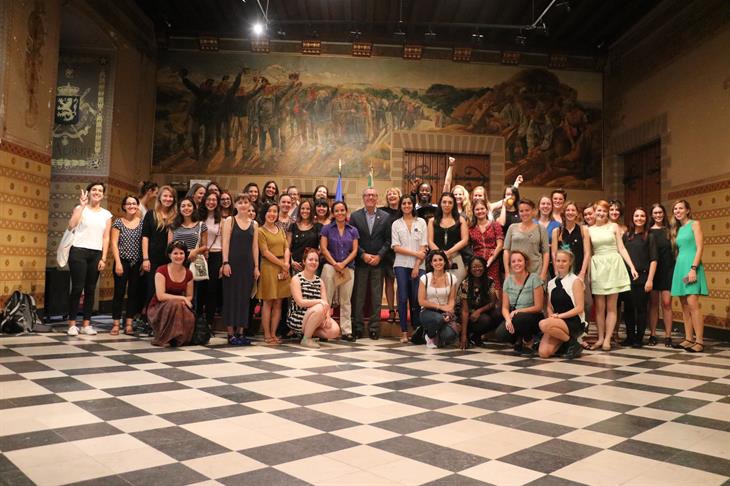
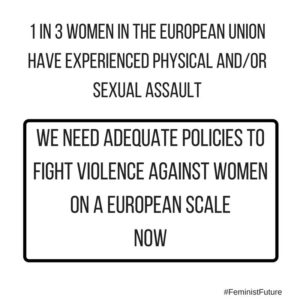
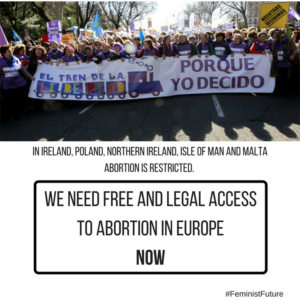
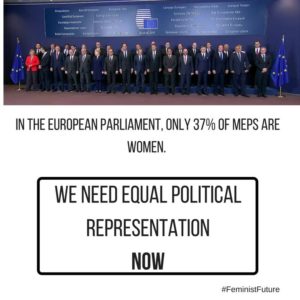
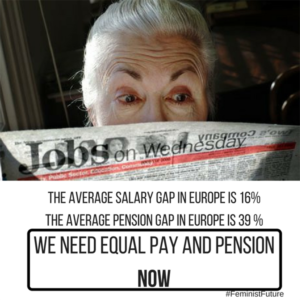



Average Rating